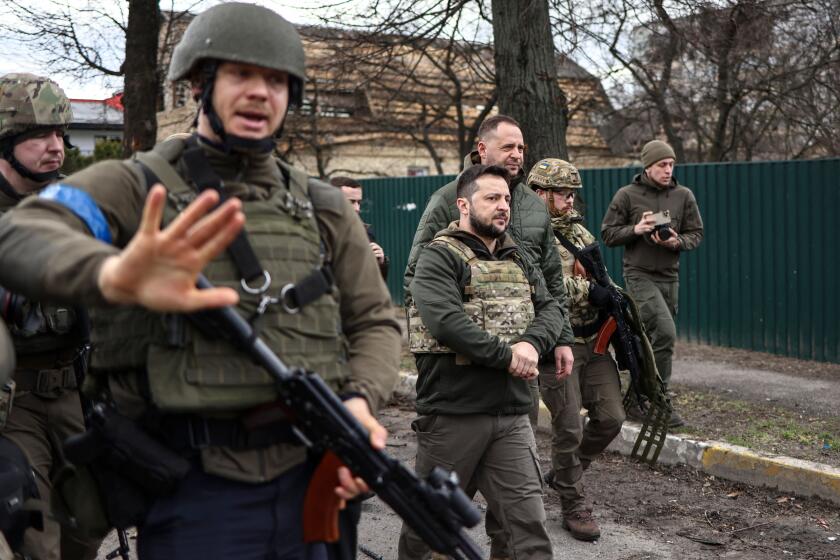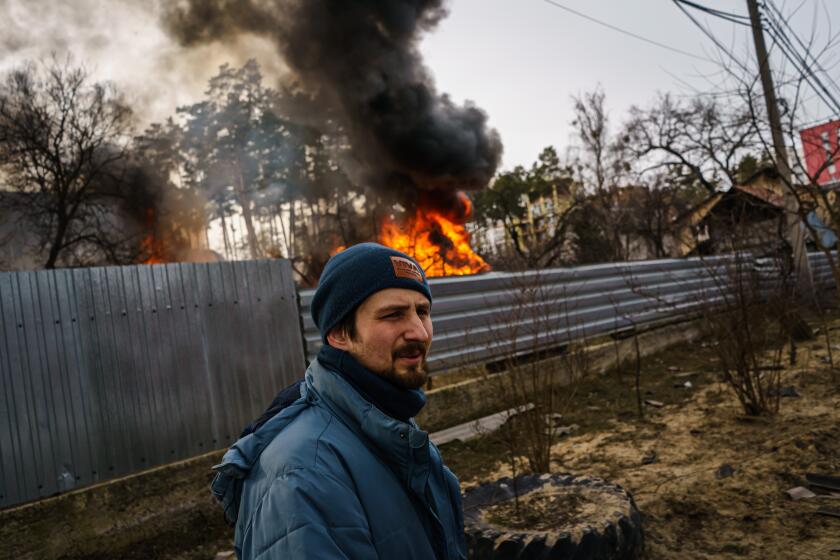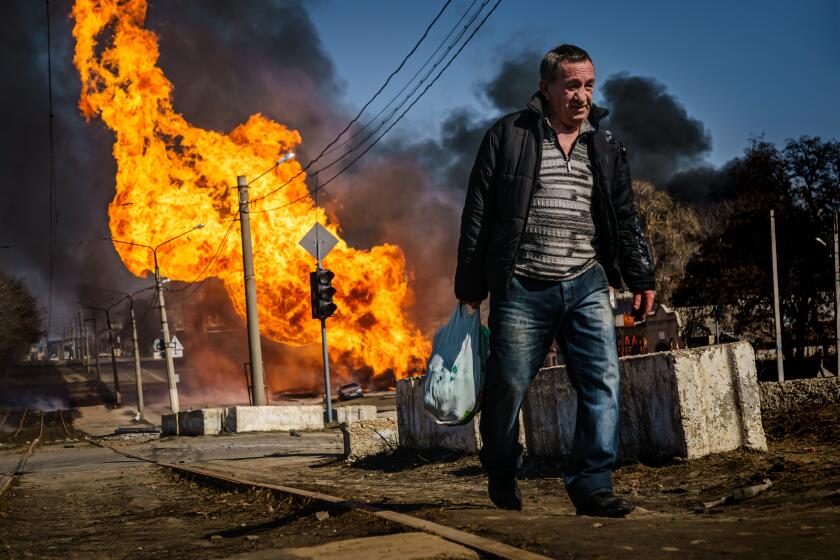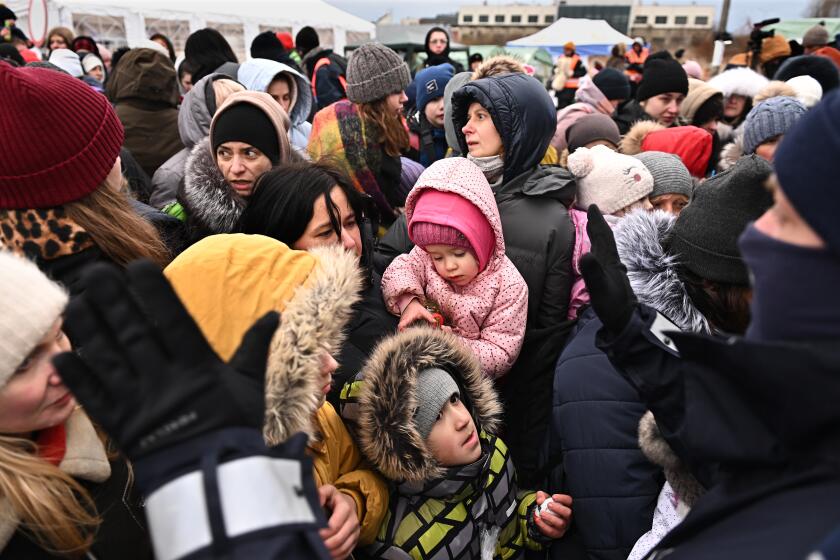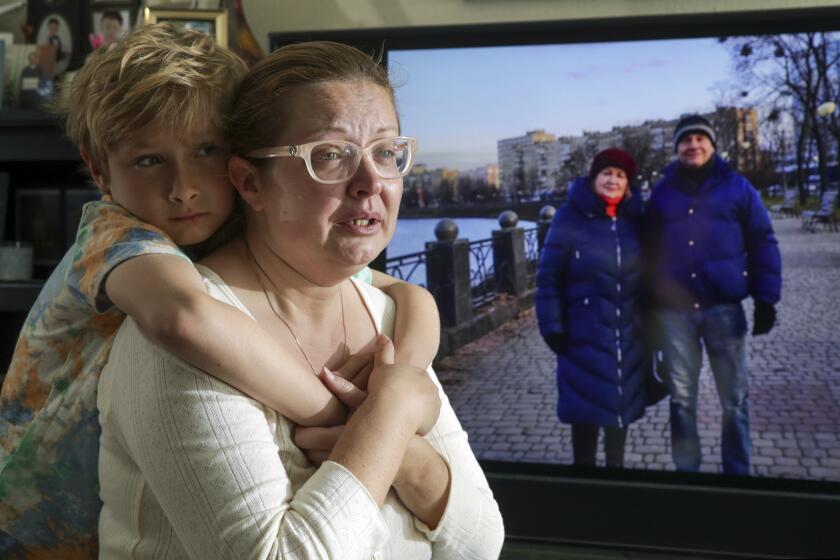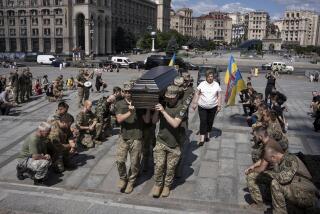Russian forces edge closer to Ukraine’s capital as leaders plan more talks

Bombardments struck across Ukraine on Monday — including a direct hit on a Kyiv apartment building.
KYIV, Ukraine — Russian invaders edged closer to Ukraine’s capital on Monday as Vladimir Putin’s forces, stalled in the suburbs for the last several days, intensified their shelling campaign, bombarding an apartment building and a shopping mall. Leaders of the embattled nation, meanwhile, tried to negotiate an exit from a war that has already sparked Europe’s biggest refugee crisis since World War II.
Despite little progress on the diplomatic front, Ukrainian presidential advisor Mykhailo Podolyak said his country would have a “hard discussion” on “peace, cease-fire, immediate withdrawal of troops and security guarantees.” Late Monday afternoon, he announced a “technical pause” in the talks but said they would pick up again Tuesday.
Podolyak expressed optimism over the new round of talks, which, unlike three previous sessions, were conducted via video rather than in person. But he also blasted Moscow.
A woman reacts as she stands in front of a house burning after being shelled in the city of Irpin.
“Although Russia realizes the nonsense of its aggressive actions, it still has a delusion that 19 days of violence against peaceful cities is the right strategy,” Podolyak said on Twitter.
For Ukrainians trying to escape, there was progress Monday as the country’s deputy prime minister, Iryna Vereshchuk, announced that 10 civilian evacuation routes — including six in the Kyiv region and three in the eastern region of Luhansk — were set to open.
After multiple failed attempts to open humanitarian corridors to the besieged seaport of Mariupol to allow residents to flee, a convoy of more than 160 private vehicles had left the city by the afternoon, the Mariupol City Council said.
“Mariupol residents, who drove their own cars, have already passed Berdyansk and continue to move in the direction of Zaporizhzhia,” the council said in its official Telegram app channel. “We also have confirmation that the ongoing cease-fire is being observed on the route of the humanitarian corridor from Mariupol.”
At the Pentagon, a senior U.S. Defense official said Monday that despite the heavy bombardments “almost all of Russia’s advances remain stalled.”
Volunteers face grim decisions in Irpin, a suburb of Kyiv, as Russian forces continue their inexorable advance.
In Kyiv, Russian forces assembled about nine miles outside the city center and had seen “no appreciable change in their progress” over the weekend, the official said in a background briefing with reporters.
Ukrainians had targeted the supply chains that sustain the Russian troops, the official said. “They’ve been quite creative here. They’re not simply going after combat capability, tanks and armored vehicles, shooting down aircraft — although they’re doing all that. They are also deliberately trying to impede and prevent the Russians’ ability to sustain themselves.”
With all of President Putin’s pre-assembled combat power now inside Ukraine, the Pentagon has not seen him attempting to replenish his forces, the senior Defense official said. The Pentagon estimated that Putin had just under 90% of that combat power available to him, and that more than 900 Russian missiles had hit Ukraine as of Monday.
Ukraine’s airspace remains contested, with the Russians continuing to want to encircle Kharkiv, Mariupol and Kyiv, the senior Defense official said. “They are increasing the amount of long-range fires on these population centers that are holding out.”
In Kyiv, a shell slammed early Monday into the ninth floor of a residential building in the Obolon neighborhood, less than seven miles from the center of the city of nearly 3 million.
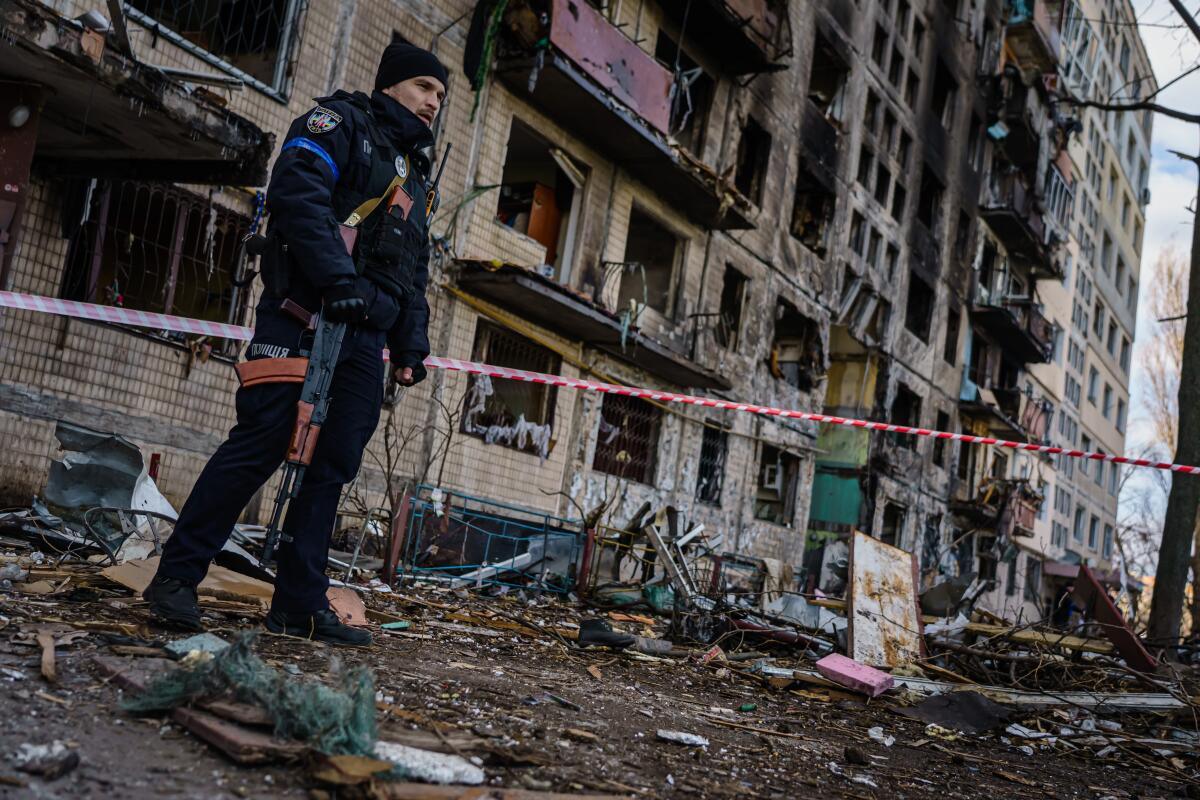
Authorities said two people were killed and nine others wounded. Dozens were evacuated. The deaths brought the United Nations’ count of civilian deaths to 636 since the invasion began Feb. 24, though officials believe the actual number is higher.
By late morning in Kyiv, rescue crews had extinguished the fires, and residents sifted through the wreckage of their apartments, chucking mangled belongings out of broken windows onto a growing pile of debris below. Dressed in fatigues, Ukrainian lawmaker Oleksiy Goncharenko spoke at the site, saying that the air attack on a residential building was proof of the Russian army’s inability to penetrate the capital.
“That’s why they’ve started this terror against civilians. They can’t do anything against our army, so they’re killing our women, children and elderly people,” he told reporters.
The Times’ Marcus Yam, no stranger to war photography, gives a first-person account from Ukraine.
He echoed other Ukrainian politicians in calling for additional assistance from Western powers.
“We will definitely win. Our morale is high. But we ask the West to protect our skies and to give us weapons,” Goncharenko said. “We’ll do it ourselves. We don’t need your boots on the ground or your pilots in the sky. Just give us arms.”
Ukrainian President Volodymyr Zelensky is expected to deliver a virtual address Wednesday to the U.S. Congress, which recently approved $13.6 billion in emergency military and humanitarian aid for Ukraine.
Citing a desire to avoid escalation with nuclear-armed Russia, the U.S. and NATO have refused Ukrainian requests to establish a no-fly zone over the country, and President Biden said he will not send troops there. The U.S. scrapped a proposal for Poland to transfer MIG-29 fighter jets to Ukraine via the U.S. air base in Ramstein, Germany.
White House Press Secretary Jen Psaki on Monday dismissed suggestions that Biden’s explicit ruling out of U.S. military force in Ukraine has given Putin confidence to pursue his bombardment of the country. The administration’s response, in coordination with allies, had “crushed” Russia’s economy, she said.
“We have hardly been on the sidelines,” Psaki said.
Biden had to balance U.S. security interests with attempts to unify the world’s democracies, she said.
“Starting World War III is certainly not in our national security interests,” Psaki said.
Thousands of American troops have been deployed to Poland, which is a North Atlantic Treaty Organization member state, unlike Ukraine. The United Nations says more than 1.5 million Ukrainian refugees have entered Poland so far, with many heading farther west in Europe. More than 2.8 million Ukrainians have fled their country in the last 2½ weeks.
Anxiety grows in Poland, where many fear Russia is on a dangerous expansionist path. History shows the Poles have every reason to be afraid.
Besides the strike on the apartment building in central Kyiv, reports said overnight shelling hit some of the capital’s suburbs, including Irpin, Bucha and Hostomel. Several hours west, airstrikes were also reported near the city of Rivne.
At dusk Monday, the Interfax-Ukraine news agency reported that a shell slammed into Lavina Mall, a suburban shopping center about eight miles northwest of central Kyiv that is one of the largest malls in Europe.
Ukraine’s Defense Ministry warned Monday that Russian forces were “purposely” destroying agricultural machinery in several regions, a move that it said would endanger spring planting and lead to a humanitarian crisis in the country and crop shortages across Europe and China. Overnight, the ministry’s main intelligence directorate said, Russians carried out a bomb attack in the Sumy region of northeast Ukraine, destroying 30 pieces of equipment.
In the south, Russian forces had continued their assault on Mariupol, where a long siege has left more than 1,200 people dead, local officials say, and forced residents to struggle to survive without electricity, running water or incoming supplies of food.
Russian troops also swooped down on the city of Berdyansk, about 40 miles southwest of Mariupol, and commandeered several Ukrainian ships berthed in the area. RT, a state-backed Russian news outlet, posted video on social media depicting Russian troops overrunning the port and inspecting a number of vessels, but the report could not be independently confirmed.
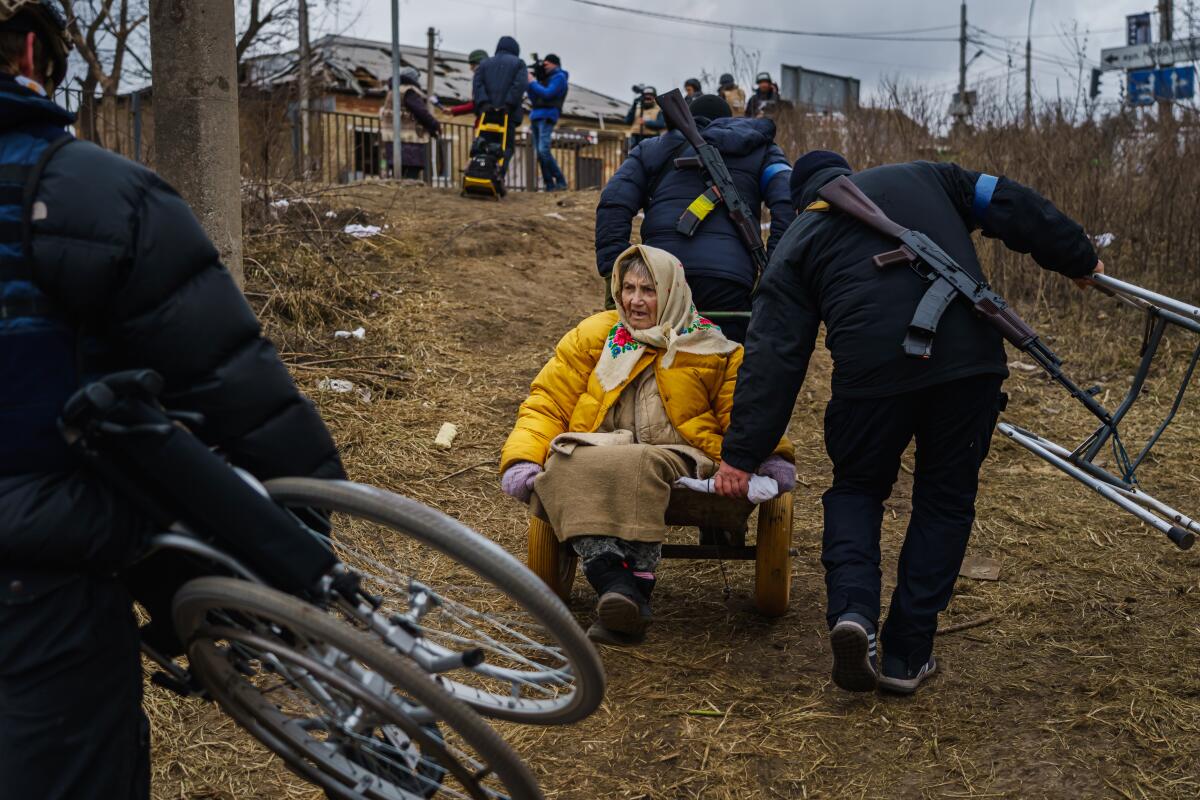
Moscow pushed back against U.S. and European Union assertions that Putin was increasing the number of targets across Ukraine out of frustration that Russian troops were not advancing swiftly enough. Kremlin spokesman Dmitry Peskov insisted that Moscow’s “special military operation” in Ukraine was going as planned, according to Russia’s Tass news agency.
He said Putin had told the military “to refrain from an immediate assault on large settlements, including Kyiv,” to avoid “heavy civilian casualties,” Peskov said.
But he added that Russia did not rule out “the possibility of placing large settlements under full control, which today are practically surrounded, with the exception of zones used for humanitarian evacuation.”
Amid reports that Russia asked China to provide weapons to support its invasion of Ukraine, Jake Sullivan, the U.S. national security advisor, on Monday met Chinese foreign policy chief Yang Jiechi in Rome.
A senior administration official who briefed reporters on condition of anonymity said it was an “intense” conversation that lasted seven hours and covered a variety of issues, including the war in Ukraine, rising tensions with North Korea and China’s escalation in the Taiwan Strait.
State Department spokesman Ned Price said Sullivan raised concerns about suggestions that China would help Russia militarily or economically as it keeps fighting the war and is buffeted by sanctions.
“We are watching very closely the extent to which China” acts to support Russia and possibly bust sanctions, Price said. “We have communicated very clearly to Beijing that we won’t stand by.... We will not allow any country to compensate Russia for its losses.”
A rocket warning app helps one family in the U.S. stay connected with relatives in war-torn Ukraine. But the real-time link also brings worry.
Vereshchuk, the Ukrainian deputy prime minister, said that two municipal officials kidnapped by the Russians — Ivan Fedorov, the mayor of Melitopol, and Yevhen Matveyev, the mayor of Dniprorudne — remained in captivity, as did Oleksiy Danchenko, a Ukrainian official who accompanied evacuation buses on an agreed route.
“We hope we will be able to get him out of forced detention” through one of Monday’s humanitarian corridors, Vereshchuk said of Danchenko.
In a video address, Zelensky told Ukrainians that his Cabinet was working on a plan to offer economic aid, in the form of a new tax model, for small and medium-size businesses.
“As long as the state is at war, as long as the people are defending themselves, the economy must be preserved and restored,” Zelensky said, adding: “Economic suppression of Ukraine is one of the tasks of the war against us. And we have to fight back from that as well. Save our economy. Save our people.”
Start your day right
Sign up for Essential California for the L.A. Times biggest news, features and recommendations in your inbox six days a week.
You may occasionally receive promotional content from the Los Angeles Times.
In the western city of Lviv, the scene was quieter a day after Russian forces attacked a Ukrainian military training base more than an hour to the west, near the Polish border. Sunday’s attack killed at least 35 people and injured more than 100.
Lviv, which has largely avoided Russian assault during the now 19 days of war and become a stopping point for those fleeing from the east, has been under overnight curfews, with residents wondering if violence will hit them next.
Shops are open, traffic clogs the city center at rush hour and the most obvious signs of war are military checkpoints and early-morning air raid sirens, which sounded across the city Monday.
As Russia’s advances continue, those in the city of 800,000 have grown more and more worried.
“We believe in our history as Ukrainian people,” said Natalia Gunko, 50, who spoke as she carried her 1-year-old granddaughter, bundled in a winter suit. “Yes, Lviv does not feel completely safe. But we believe in our ultimate victory.”
Artem Velichko, an 18-year-old student and street musician, noted the increasing sense of insecurity.
“People feel like they are being targeted,” Velichko said, with his guitar in a pack on his back. “It’s really scary.”
Bulos reported from Kyiv, Jarvie from Atlanta and Kaleem from London. Patrick J. McDonnell in Lviv , Henry Chu in London and Tracy Wilkinson, Eli Stokols and Anumita Kaur in Washington contributed to this report.
More to Read
Sign up for Essential California
The most important California stories and recommendations in your inbox every morning.
You may occasionally receive promotional content from the Los Angeles Times.
